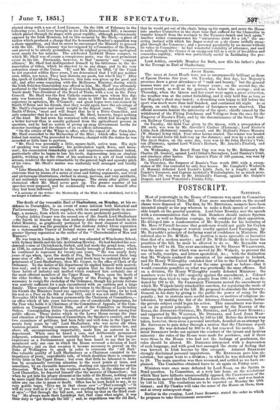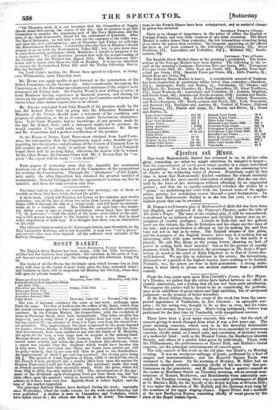POSTSCRIPT.
SATURDAY.
Most of yesternight in the House of Commons was spent in Committee on the Ecclesiastical Titles Bill. Four more amendments on the second clause were disposed of. The first, by Mr. REYNOLDS, seems to have been intended simply as the peg whereon to make a fresh speech of consider- able length on the general question. Lord Jolts RUSSELL met the speech with a recommendation that the Irish Members should imitate Spartan brevity, as well as Spartan courage, in the conduct of their opposition. He diverged into a condemnation of Mr. Reynolds for his lecturing of Mr. More O'Ferrall because that gentleman would not guide his Ceylon vote, involving a charge of wanton cruelty against Lord Torrington, 13y Mr. Reynolds's principle of declaring want of confidence in Ministers. He referred also to Dr. WHale. No position is more agreeable or lucrative than that of a modern martyr ; and if Dr. M'Eale thinks fit to incur the penalties of the bill, he must be allowed to do so. Mr. Reynolds was beaten by 107 to 38. The next amendment, by Sir HENRY WILLOUGHBY, was the same as that which was moved by. Mr. Walpole, to prevent the use of bulls, rescripts, and letters apostolical, &c.; with the distinction that Mr. Walpole confined the operation of his amendment to Ireland, and Sir Henry Willoughby extended that of his to the United Kingdom. Lord Joust RUSSELL opposed it on the same ground as before—that it would cumulate penalties on what was practically the same offence. But on a division, Sir Henry Willoughby nearly defeated Ministers : the numbers were 133 to 129—majority against the amendment, 4. Colonel &famine then tried to raise the penalty from 100/. to 500/. ; and was de- feated by 199 to 63. Sir FREDERICK. THESIGER moved the amendment to which Mr. Walpole lately attached his sanction, for regulating the mode of enforcing the penalties of the bill. He proposed to stimulate the Attorney- General in his duty by giving to the public the power of suing for the penalty ; but to restrain mere sordid motives, or motives of religious in- tolerance, by making the fiat of the Attorney-General necessary, before the private subject could begin his action. This amendment was discus- sed on its general principles. It was opposed by the MAST'En of the Rome, the ATTORNEY-GENERAL, Mr. BETHELL, and Lord JOHN RUSSELL; and supported by Mr. WALPOLE, Mr. DISRAELI, and Lord Joins- MAN- NERS. It was ultimately negatived, by 166 to 130. Before the division was taken, however, there arose a personal interlude, founded on an attempt by Mr. REYNOLDS to gain delay through a motion that the Chairman report progress. He was defeated by 306 to 41, but renewed his motion. Ad- miral BERKELEY broke out against the conduct of the tyrant and factious minority : the rules of the House were made for gentlemen, and if there were those in the House who had not the feelings of gentlemen, the rules should be altered. Mr. DISRAELI interposed with a deprecation of such language, and with good tact assuaged the storm of feeling that was brewed in Irish bosoms by this escapade. Admiral BERKELEY strongly disclaimed personal imputations. Mr. REYNOLDS gave him ab- solution; but again went to a division ; in which he was defeated by 230 to 29. The main question was then resumed, and settled as we have ex- plained. The Committee obtained leave to sit again on Friday next. Ministers were once more defeated by Lord Nees, on the Spirits in Bond question. In Committee, at a very late hour, on the resolutions which they have hitherto unsuccessfully opposed, the CHANCELLOR of the Exarecerim moved that the Chairman do leave the chair; and was beaten
140 to 123. The resolutions are to be reported on Monday the 16th instante;anrdSiCharleastwll stage.
will the sense of the House on them, then and at every subsequent Earlier in the evening, Lord JOHN RUssELL stated the order in which he proposes to take Government measures- " On Thursday next, it is our intention that the Committee of Supply should stand fret among the orders of the day ; and we propose to go Into Committee to consider the remaining part of the Navy Estimates, and the plan of my right honourable friend for the retirement of Admirals. After the Naval Estimates, we will take a vote for the expenses of the Caffre war, and then the civil contingencies ; and on Thursday and Friday we will take the Miscellaneous Estimates. I stated the other day that on Monday I should propose to go on with the Ecclesiastical Titles Bill ; but, to give more time to some honourable gentlemen—Irish Members—I intend to postpone it for a longer period. We will therefore proceed first with the second reading of the Customs and the Window-tax Repeal Bills. The Miscellaneous Esti- mates will be taken after those two bills on Monday.. It is not my intention to resume the Ecclesiastical Titles Bill until the Friday following, that is, this day fortnight."
On Lord John's motion, the House then agreed to adjourn, at rising, over Whitsuntide, until Thursday next.
Mr. HUME was again unable to get forward in the nomination of his Select Committee on the Income-tax. After considerable discussion, the Cittsteraxon of the Excuser:ten volunteered assistance if the subject were postponed till Friday next. Sir Charles Wood is now willing to serve, if some Members having experience in financial matters, and sharing his views on the particular question, will enter the Committee and protect his views when other duties require him to be absent.
Mr. EWART reminded Lord John Russell of the promise made by the late Sir Robert Peel, that on going into the Education Estimates a Minister of the Crown should make a statement of the condition and progress of education, so far as it comes under Government administra- tion. Lord JOHN Russita.r. had no knowledge of any promise made by the late Sir Robert Peel ; such a statement might not be prudent : he would consider if he could make any further statement. Mr. Humz and Mr. CARDWELL had a perfect recollection of the promise.
In the House of Peers, Lord %Drones:I obtained from Lord CLAM- HELL the information that the Commission issued some months ago fbr inquiring into the practice and pleadings of the Courts of Common Law in this country are not yet ready to present their report. Lord Campbell hoped there will be no long delay, otherwise the session will be wasted. In the other House Sir GEORGE GREY told Mr. J. EVANS that he " ex- pects " the report will be ready " very shortly."



























 Previous page
Previous page